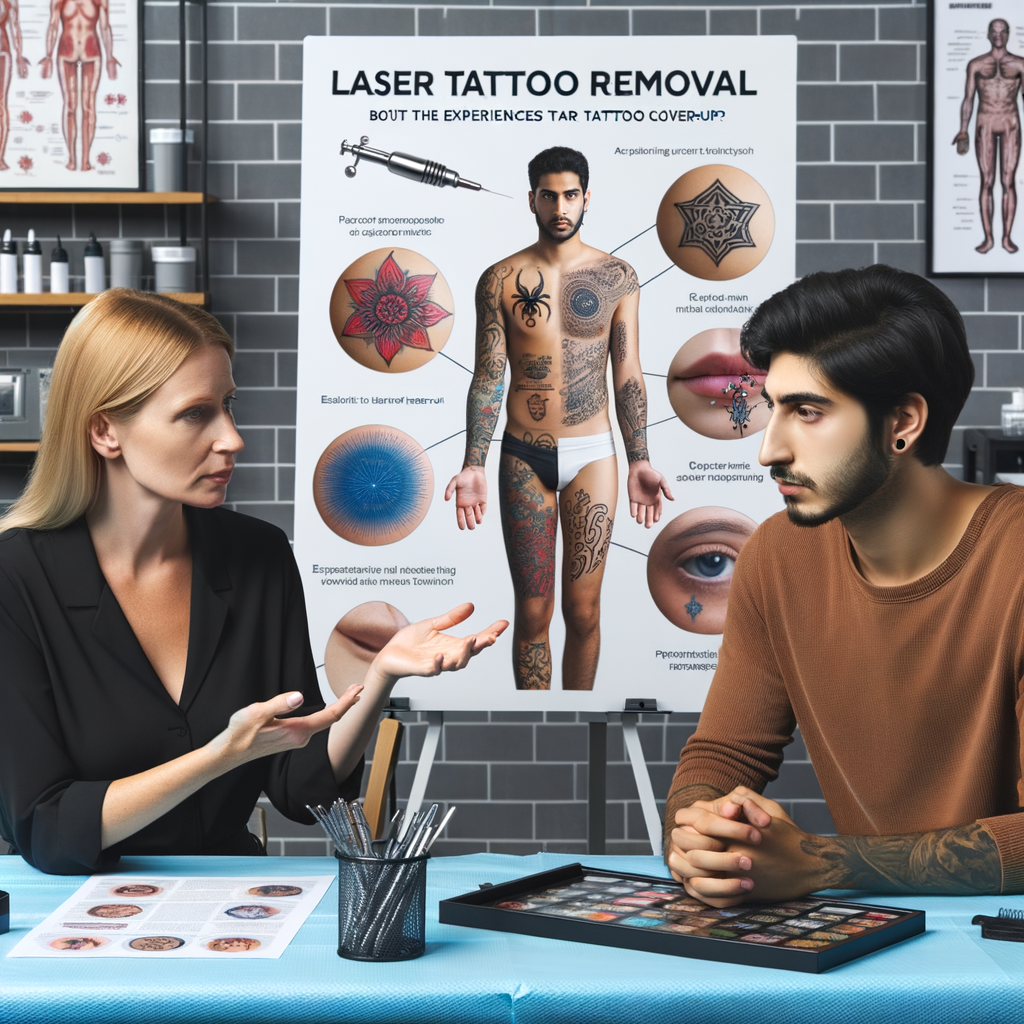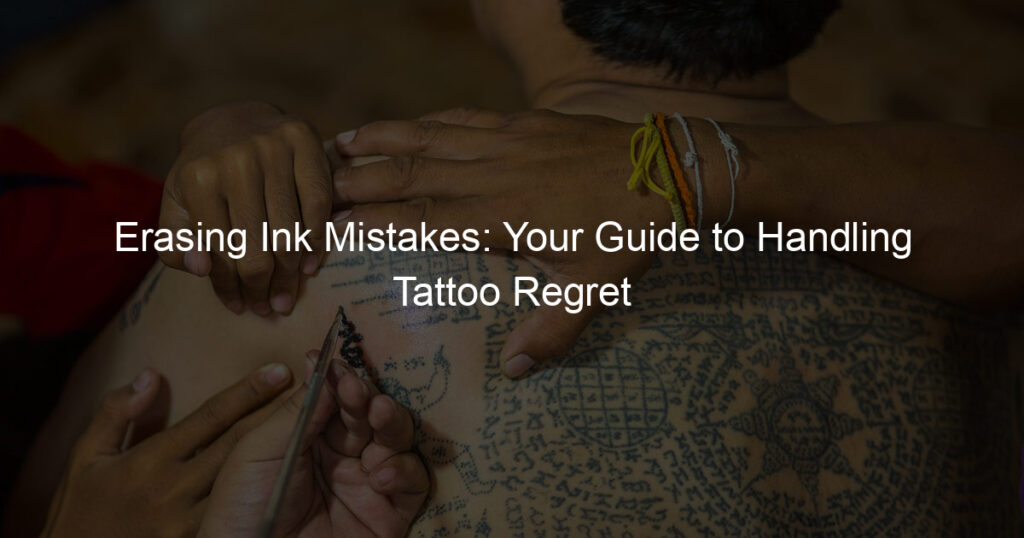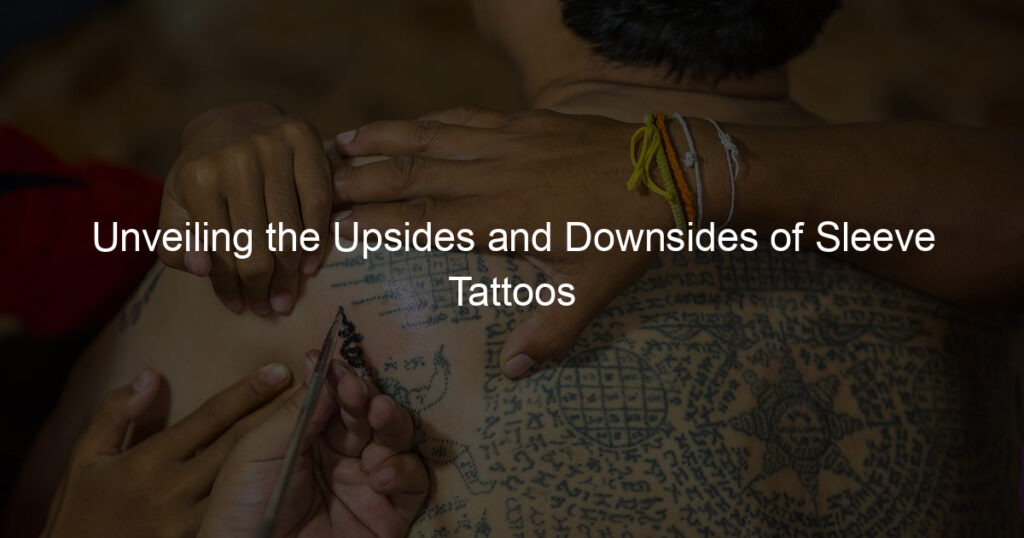
Introduction to Tattoo Regret
Getting a tattoo is a significant decision. It’s a form of self-expression that lasts a lifetime. However, sometimes, people end up regretting their tattoos. This is what we call ‘tattoo regret’. Let’s delve into this concept and explore some statistics on the matter.
Tattoo regret is the feeling of remorse or dissatisfaction that some people experience after getting a tattoo. It can stem from various reasons, such as a poorly executed design, a change in personal tastes, or a tattoo that no longer holds the same meaning it once did. This regret can lead to discomfort, embarrassment, and a desire to remove or cover up the tattoo.
According to a survey by the American Society for Dermatologic Surgery, nearly 23% of people with tattoos regret getting at least one of them. That’s almost one in four people! Another study found that the most common reasons for tattoo regret include being too young when the tattoo was received, the tattoo’s visibility, and changes in lifestyle or personal taste.
Understanding tattoo regret is the first step towards dealing with it. In the following sections, we will explore common reasons for tattoo regret, how to deal with unwanted tattoos, and various solutions and procedures for tattoo removal.
Common Reasons for Tattoo Regret
While tattoos can be a beautiful form of self-expression, they can also lead to regret. There are several common reasons why people experience tattoo regret. Let’s explore these reasons in detail.
-
- Impulsive Decisions
One of the most common reasons for tattoo regret is making impulsive decisions. Many people get tattoos on a whim, without giving much thought to the long-term implications. According to a survey, around 75% of people who regret their tattoos attribute it to impulsive decisions. These tattoos often have little personal significance and can become a source of embarrassment over time.
-
- Change in Personal Beliefs or Values
People evolve, and so do their beliefs and values. What might have seemed like a good idea at one point in life may not align with a person’s current values. For instance, a person might get a tattoo that represents a certain belief or value, only to find that they no longer identify with it years later. This mismatch can lead to tattoo regret.
-
- Low-Quality Tattoos
Another common reason for tattoo regret is low-quality tattoos. Not all tattoo artists are created equal, and a poorly executed tattoo can lead to dissatisfaction. This could be due to poor design, incorrect spelling, or fading over time. A survey found that 30% of people regret their tattoos because they are of low quality.
In conclusion, tattoo regret is often a result of impulsive decisions, changes in personal beliefs or values, and low-quality tattoos. It’s important to think carefully before getting a tattoo and to choose a reputable tattoo artist to ensure the quality of the work.
Dealing with Unwanted Tattoos
Unwanted tattoos can be a source of distress and discomfort. However, there are ways to deal with them, and this section will provide some advice on how to manage tattoo regret.
Tattoo Regret Advice
When dealing with tattoo regret, there are two main paths you can consider:
-
- Living with the Tattoo
One option is to learn to live with your tattoo. It’s important to remember that tattoos are a part of your life story. They represent a moment in time, a decision you made, or a memory you wanted to keep. Even if you now regret the tattoo, it’s a part of who you are. Accepting it can be a process of personal growth and acceptance.
-
- Seeking Professional Advice
If you’re unable to accept your tattoo, another option is to seek professional advice. Tattoo artists, dermatologists, and even mental health professionals can provide valuable insights and advice. They can discuss options such as tattoo modification or removal, or help you deal with the emotional aspects of tattoo regret.
Remember, dealing with unwanted tattoos is a personal journey. What works for one person may not work for another. It’s important to find a solution that feels right for you.
Managing Tattoo Regret
Dealing with tattoo regret can be a challenging process. However, there are steps you can take to manage your feelings and explore potential solutions. Here are two key strategies:
-
- Acceptance and Patience
Firstly, it’s important to accept your feelings of regret. It’s completely normal to have mixed emotions about a tattoo, especially if it’s not what you expected or wanted. Remember, tattoos are a form of self-expression and sometimes, our feelings about them can change over time. It’s okay to feel regret. The key is to be patient with yourself as you navigate these feelings.
-
- Exploring Removal Options
Secondly, if your feelings of regret persist, it might be time to explore tattoo removal options. There are several methods available, including laser removal and surgical excision. Each method has its pros and cons, and what works best will depend on factors like the size, color, and location of your tattoo. It’s important to do your research and consult with a professional to understand your options.
In conclusion, managing tattoo regret involves a combination of acceptance, patience, and exploration of removal options. It’s a journey that requires time and thought, but with the right approach, you can find a solution that works for you.
Tattoo Regret Solutions
It’s not uncommon to have a change of heart about a tattoo. Whether it’s due to a change in personal taste, a shift in life circumstances, or simply a poorly executed design, tattoo regret is a real issue. Fortunately, there are several solutions available for those who wish to remove or alter their unwanted tattoos.
Tattoo Removal Options
There are a variety of methods available for tattoo removal, each with its own set of advantages and disadvantages. Here are the most common ones:
-
- Laser Tattoo Removal
Laser tattoo removal is one of the most popular and effective methods. It involves using a high-intensity light beam to break up the pigment colors of the tattoo. Multiple sessions are usually required, and the process can be uncomfortable, but it’s often successful in completely removing the tattoo.
-
- Surgical Tattoo Removal
Surgical tattoo removal involves cutting out the tattooed skin and stitching the surrounding skin together. This method is typically used for smaller tattoos and can leave a scar, but it’s often a quicker solution than laser removal.
-
- Tattoo Removal Creams
There are also creams available that claim to fade tattoos over time. These are less invasive and less painful than other methods, but their effectiveness varies widely. It’s important to do your research and consult with a professional before trying a tattoo removal cream.
Remember, tattoo removal should always be done by a trained professional to ensure safety and effectiveness. It’s also important to have realistic expectations about the results, as some tattoos may not be completely removable.
Tattoo Cover-up Ideas
When it comes to dealing with unwanted tattoos, you have a couple of creative options. You can either get a new tattoo over the old one or use makeup to cover it up. Let’s delve into these methods a bit more.
- Getting a new tattoo over the old one
If you’re still a fan of body art but not so much of your current tattoo, getting a new tattoo over the old one might be the perfect solution for you. This process, known as a tattoo cover-up, involves designing a new tattoo that can incorporate and effectively hide the old one.
It’s important to note that the success of a tattoo cover-up largely depends on the size, color, and location of the original tattoo. Darker and larger tattoos might be harder to cover, but a skilled tattoo artist can work wonders.
Remember, it’s crucial to choose a design you love and a professional artist to ensure the best results. You don’t want to end up wanting to cover up your cover-up!
- Using makeup to cover the tattoo
If you’re looking for a less permanent solution, using makeup to cover your tattoo can be an effective method. This can be especially useful for special occasions or job interviews where visible tattoos might not be appropriate.
Start by cleaning the tattooed area and applying a primer. Then, use a high-coverage concealer that matches your skin tone to cover the tattoo. Set the concealer with a setting powder to ensure it stays in place. You might need to repeat the process a few times to completely cover the tattoo.
Keep in mind, waterproof and smudge-proof products are your best bet to ensure the makeup stays put. Also, this method requires some practice to get right, so don’t get discouraged if it doesn’t work perfectly the first time.
Tattoo Removal Procedures
There are various methods to remove tattoos, but one of the most common and effective is laser tattoo removal. Let’s delve into the details of this procedure.
Laser Tattoo Removal
Laser tattoo removal is a popular option for those who wish to erase their ink. It utilizes laser technology to break down the tattoo ink into tiny particles, which are then naturally eliminated by the body.
-
- Understanding the Process
Laser tattoo removal works by directing concentrated light energy onto the tattoo. The light is absorbed by the tattoo ink, causing it to break down into tiny particles. These particles are then naturally flushed out by the body’s immune system over time. It’s important to note that this process usually requires multiple sessions, depending on the size and color of the tattoo.
-
- Pros and Cons
| Pros | Cons |
|---|---|
| Effective on most tattoo colors | May require multiple sessions |
| Minimal scarring | Possible skin discoloration |
| Non-invasive procedure | Can be painful |
While laser tattoo removal is effective and non-invasive, it may require multiple sessions and can potentially cause skin discoloration or discomfort during the process.
-
- Costs and Considerations
The cost of laser tattoo removal can vary greatly depending on the size, color, and location of the tattoo, as well as the number of sessions required. On average, it can range from $200 to $500 per session. It’s also important to consider potential side effects, such as temporary redness, swelling, and blistering. Always consult with a professional to understand all aspects of the procedure and to ensure it’s the right choice for you.
Surgical Tattoo Removal
When it comes to removing unwanted tattoos, one option that might come to mind is surgical tattoo removal. This method involves a surgical procedure to physically remove the tattooed skin. Let’s delve deeper into the process, its pros and cons, and the costs involved.
- Understanding the Process
Surgical tattoo removal, also known as excision, is a procedure where a surgeon cuts out the tattooed skin and stitches the surrounding skin together. This method is typically used for smaller tattoos, but larger ones can also be removed through a process called serial excision, which involves multiple surgeries.
- Pros and Cons
| Pros | Cons |
|---|---|
| Effective for small tattoos | Not suitable for large tattoos |
| Immediate results | Potential for scarring |
| One-time procedure | Requires recovery time |
While surgical tattoo removal can be effective for small tattoos and provides immediate results, it’s not suitable for large tattoos. There’s also the potential for scarring and a recovery period to consider.
- Costs and Considerations
The cost of surgical tattoo removal can vary depending on the size and complexity of the tattoo, as well as the surgeon’s experience. It’s important to consider these costs, along with potential risks and recovery time, when deciding if this method is right for you.
Remember, it’s crucial to consult with a professional before making a decision. They can provide you with a detailed understanding of the process, potential risks, and recovery expectations.
Tattoo Regret Experiences
Many people experience tattoo regret at some point in their lives. Let’s explore some real-life experiences of individuals who have dealt with this issue. These case studies will provide a deeper understanding of the different ways people handle tattoo regret.
-
Case Study 1: Successful Laser Tattoo Removal
Meet John, a 28-year-old man who got a tattoo of a band logo when he was 18. As he grew older, his music tastes changed, and he began to regret his tattoo. He decided to undergo laser tattoo removal. After several sessions, John’s tattoo was successfully removed. He expressed relief and satisfaction with the process, even though it was a bit painful and took some time. This case illustrates that laser tattoo removal can be a viable option for those who regret their tattoos.
-
Case Study 2: Successful Tattoo Cover-Up
Next, we have Lisa, a 35-year-old woman who got a tattoo of her boyfriend’s name when she was in her early 20s. After they broke up, she regretted the tattoo. Instead of removing it, she decided to get a cover-up tattoo. A skilled tattoo artist transformed her ex-boyfriend’s name into a beautiful floral design. Lisa was thrilled with the result and felt like she had reclaimed her skin. This case shows that a well-done cover-up can be a creative solution to tattoo regret.
-
Case Study 3: Living with Tattoo Regret
Finally, let’s look at Mike, a 40-year-old man who got several tattoos in his youth that he now regrets. However, he decided not to remove or cover them up. Instead, he chose to live with his tattoo regret as a reminder of his past decisions and growth. Mike’s case demonstrates that it’s also possible to cope with tattoo regret without undergoing any procedures.
In conclusion, tattoo regret is a common experience, and there are several ways to deal with it. Whether it’s through laser removal, a cover-up, or simply living with the regret, the most important thing is to make a decision that feels right for you.
Solutions for Tattoo Mistakes
Everyone makes mistakes, and sometimes those mistakes can be in the form of a tattoo. Whether it’s a misspelled word, a poorly drawn image, or a symbol that no longer holds the same meaning, tattoo mistakes can be a source of regret. However, there are solutions available to help you deal with these mistakes. Let’s explore some of these solutions.
-
Preventing Tattoo Mistakes
Prevention is always better than cure. The same principle applies to tattoos. The best way to avoid tattoo mistakes is to prevent them from happening in the first place. Here are some tips:
- Research: Before getting a tattoo, do your homework. Look at the tattoo artist’s portfolio, read reviews, and ask for recommendations. Make sure the artist is skilled and experienced.
- Plan: Don’t rush into getting a tattoo. Take your time to plan what you want. Think about the design, the size, and the location of the tattoo. Remember, a tattoo is permanent.
- Proofread: If your tattoo includes text, make sure to proofread it. Check for spelling and grammar errors. It’s better to be safe than sorry.
-
Learning from Others’ Experiences
Another way to avoid tattoo mistakes is by learning from others’ experiences. Here are some lessons we can learn from people who have dealt with tattoo regret:
- Think Twice: Many people regret getting a tattoo on impulse. So, think twice before you ink.
- Consider the Future: Some people regret getting a tattoo that doesn’t age well. Consider how your tattoo might look as you grow older.
- Choose Wisely: Some people regret getting a tattoo of a significant other’s name. Remember, relationships can end, but tattoos are permanent.
In conclusion, tattoo mistakes can be prevented by careful planning and learning from others’ experiences. However, if you do end up with a tattoo mistake, don’t despair. There are solutions available, from tattoo cover-ups to laser tattoo removal. The key is to make informed decisions and to choose a skilled and experienced tattoo artist.
Conclusion: Navigating Tattoo Regret
As we reach the end of our exploration into tattoo regret, it’s important to reflect on the key insights we’ve gathered. Tattoo regret is a common experience, but it’s not a life sentence. There are many ways to navigate this situation, and we hope this guide has provided you with some valuable tools and perspectives.
- Key takeaways
Let’s summarize the main points we’ve covered:
| Topic | Key Insight |
|---|---|
| Reasons for Tattoo Regret | Common reasons include impulsive decisions, changes in personal beliefs, and poor tattoo quality. |
| Dealing with Unwanted Tattoos | Options include tattoo modification, cover-ups, or removal procedures. |
| Tattoo Removal Procedures | These can be effective but often require multiple sessions and can be costly. |
- Final advice for those dealing with tattoo regret
Remember, it’s completely normal to experience tattoo regret. It’s a part of life and growth. The most important thing is to not rush into any decisions. Take your time to explore your options and consult with professionals. Whether you choose to modify, cover up, or remove your tattoo, make sure it’s a decision you’re comfortable with.
As the famous quote goes, “This too shall pass.” Tattoo regret can be a tough journey, but with the right approach and mindset, it’s a journey you can navigate successfully.














